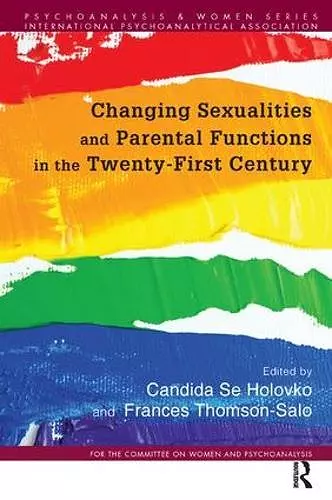Changing Sexualities and Parental Functions in the Twenty-First Century
Changing Sexualities, Changing Parental Functions
Candida Se Holovko author Frances Thomson-Salo editor Candida Se Holovko editor
Format:Paperback
Publisher:Taylor & Francis Ltd
Published:2nd Mar '17
Currently unavailable, and unfortunately no date known when it will be back
This paperback is available in another edition too:
- Hardback£135.00(9780367104184)

Recent societal changes have challenged long-established concepts in psychoanalysis, including the Oedipus complex, parental functions, and male and female psychosexuality. 'Postmodern families', based on sexual and emotional exchanges independent of gender, now include homoerotic couples who adopt children, or who create them through assisted fertilisation, as well as single parent families and blended families. A number of highly-renowned Latin American psychoanalysts have drawn attention to the urgency of revising theoretical and clinical concepts in the light of these new scenarios. In this book, they open up ideas which cover familiar territory of current concerns in psychoanalytic work, as well as other little-explored areas, with the emphasis on evolving sexualities and new experiences of parenthood. The first section revisits psychoanalytic theories, particularly parental functions in the area of sexuality and gender. The following section discusses new family configurations, and vicissitudes of the desire to have a child in men and women, with the authors presenting some psychic consequences for parents in therapy who have turned to assisted fertilisation. The third section, on sexual diversity and the neosexualities, includes the topics of intersexuality, the fantasy of neuter gender, countertransference in psychotherapy with gender identity disorders patients, and same-sex parenting. The final section pays tribute to Mariam Alizade, overall chair of COWAP from 2001-2005. As our psychoanalytic thinking and practice becomes more complex and sophisticated, our understanding of the analytic process is correspondingly deepened.
'The publication of this new volume in the Psychoanalysis and Women Series is very much a cause for celebration. It is an excellent collection that brings together a series of articles on topics currently discussed throughout the world, allowing an English-speaking audience to gain access to this intense, creative and vital debate. It is when dialogue not only implies "conversation" between colleagues, but also a crossing of geographic contexts in order to "listen" to how psychoanalysis is practised and thought of in different regions that we realise we are truly on a path towards the broadening of the horizons of psychoanalysis. This journey depends on initiatives such as the one born out of this book.'--Virginia Ungar, President-elect of the International Psychoanalytical Association'Bursting out of a carapace of classical and conventional psychoanalysis, this book captures a moment in time when colours shimmer before wings become airborne. Drawn from clinicians across Latin America, the book reflects the unique history and distinctive development of psychoanalytic thinking on this continent as well as current shifts in the social imaginary - altered power relations between men and women and new configurations of sexuality and family formation. Poignant case histories reveal traces of unrepresented social trauma, and the complexity of transgenerational ravages of loss, incest, violence and drugs amongst adolescent mothers, older parents and their infants, street children, infertile couples and gamete donors - all embedded in the diversity of age, gender, sexuality, religion, ethnicity, "casta", urbanity and migratory experience across these different societies.'--Professor Joan Raphael-Leff, foundational Committee on Women and Psychoanalysis (COWAP) Chair; Leader of the Academic Faculty for Psychoanalytic Research, Anna Freud Centre, London'The diverse transformations separating sexuality from reproduction, conceiving children, and creating families in the twenty-first century affect the symbolic system so that psychoanalytic theories have to be reconsidered. This book illuminates groundbreaking work in rapidly changing sexual diversities and parental situations with outstanding psychoanalysts reflecting on new ways of loving, and raising families.'--Gertraud Schlesinger-Kipp, COWAP overall Chair'This book brings us closer to the wealth and strength of the thought of Latin American psychoanalysts from different geographies. The diversity of issues addressed by the book are very modern and interesting for contemporary psychoanalysis, just as transformations in parenting, sexual diversity and new ways of conceiving children through reproductive techniques. Crossing the borders of the language and entering into dialogue with different authors, it invites us to the challenge of rethinking theoretical concepts that were developed under the heterosexual nuclear family model of the last century, which are currently in revision. The different voices that run this book's pages put the reader in contact not only with theory but also find clinical material of great wealth. The topics revolve around maternal and paternal functions, neosexuality, intersex, neutral gender, child desire and reproductive techniques, transfer and countertransference, and new social contexts.'Patricia Alkolombre, Full member with training function, Argentine Psychoanalytic Association, and Coordinator of the Eleventh COWAP Latin American Dialogue on 'Parenthoods and Gender: Their influence on subjectivity', Buenos Aires, 2014
ISBN: 9781782204947
Dimensions: unknown
Weight: unknown
266 pages